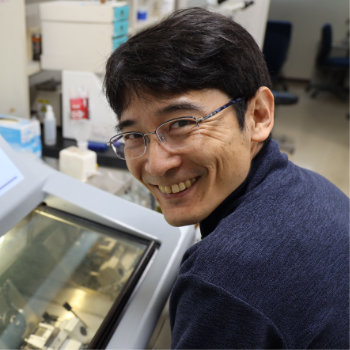Dr. Shinichi NakagawaWritten by: Dr. Vidhyadhar Nandana  “My greatest reward is having the opportunity to work in the field of RNA research” says anexhilarated Dr. Shinichi Nakagawa. Dr. Nakagawa is a prominent RNA researcher whose research focuses on unveiling the potential of long noncoding RNAs (lncRNAs). He completed his PhD in 1998 under the guidance of Dr. Masatoshi Takeichi at the Kyoto University in Japan. He then obtained two years of post-doctoral experience with Dr. Christine Holt at Cambridge University in the United Kingdom before joining as an Assistant professor at Kyoto University in 2000. In 2016, he became a professor at Hokkaido University in Japan and currently heads an RNA biology laboratory at the same University where he and his group investigate the fascinating world of lncRNAs and intrinsically disordered proteins. The beginning of his career was driven by his desire to discover ‘my gene’ – one previously unstudied, in specific pathways, such as axon navigation at a chiasm and the generation of retinal organoids with normal histology. Although he found answers to his scientific questions, the players turned out to be well-documented genes known for their functions in other systems. This shifted his approach, and he started focusing on genes lacking annotated molecular functions, like lncRNAs, pursuing phenotypes via mutant studies.
Over the years, Dr. Nakagawa has made significant contributions to the RNA field. His work includes the early generation and phenotypic description of mutant mice that lack abundant nuclear noncoding RNAs, such as Gomafu, Neat1, and Malat1. He also discovered that murine-specific noncoding RNA 4.5SH functions as a natural therapeutic RNA that neutralizes toxic exonization of retrotransposon SINE B1. Dr. Nakagawa expresses profound gratitude towards his PhD supervisor, Dr. Takeichi, and both his postdoctoral mentor Dr. Holt and her husband Dr. Bill Harris. Their guidance has been pivotal in helping him understand that science is not only fascinating but also deeply enjoyable. This is the message he wishes to convey to young researchers - that regardless of the path they choose in doing science, the most important aspect is to enjoy it - “As diverse as living organisms are, there are numerous ways to enjoy science, and thus, enjoy life. One may be happiest upon finding the optimal path, which, while perfect for them, may be suboptimal or even the worst choice for someone else”. In offering advice to non-native English researchers, “Original findings compel one to communicate with others, regardless of language barriers. This, truly, is the beauty of scientific research”. Dr. Nakagawa underscores the immense value of attending the RNA Society’s Annual Meeting. He sees it as a unique opportunity to connect with peers who share similar passions and perspectives. He recalls a specific instance where he attended such a meeting shortly after facing rejection for one of his papers. Encouraged by fellow RNA researchers at the gathering, he submitted a follow-up appeal to the journal editor. This led to a re-evaluation of his paper and its eventual acceptance for publication. His favorite article from RNA is 'UPA-seq: prediction of functional lncRNAs using differential sensitivity to UV crosslinking'. Dr. Nakagawa’s favorite RNA is Gomafu, and he still remembers the vivid emotion when he observed its subcellular localization – ‘it was love at first sight without any second thoughts’. Connect with Dr. Nakagawa through his lab website or via X @smoltblue. |
